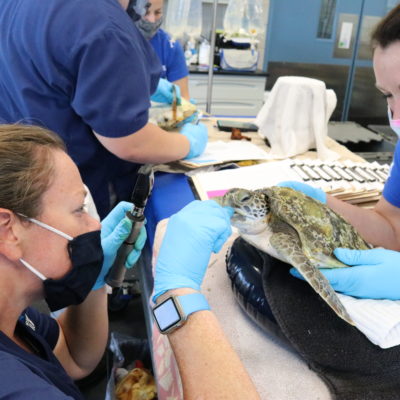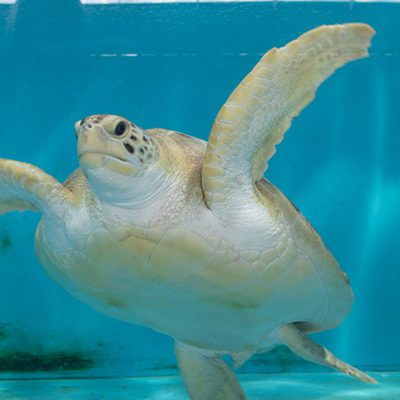Press Room
A coral baby boom is underway at The Florida Aquarium’s Coral Conservation and Research Center in Apollo Beach, where biologists are spawning thousands of new symmetrical brain coral and boulder brain coral—critical to the future of Florida’s Coral Reef.
CLICK HERE TO DOWNLOAD BROADCAST-QUALITY
VIDEO AND PHOTOS OF THE BRAIN CORAL SPAWNING
Thanks to funding from the Florida Department of Environmental Protection (DEP) through the Florida’s Coral Reef Restoration and Recovery Initiative (FCR3) grant program, the Aquarium is bringing new life to Florida’s Coral Reef through an effort to grow 5,000 baby corals over the next two years and produce hundreds of thousands of coral larvae for partners.
The juvenile corals will be shared with partners like I.CARE to support coral restoration efforts in the Florida Keys National Marine Sanctuary and the Kristin Jacobs Coral Aquatic Preserve in southeast Florida. The spawning parent corals were originally rescued from the reef to protect them from the devastating effects of stony coral tissue loss disease.
“These new corals represent a lifeline for Florida’s reef,” said Keri O’Neil, Director of the Coral Conservation Program for The Florida Aquarium. “We’re thankful to the Florida DEP for making this work possible. Their support is helping us not only spawn more corals—we’re building hope for the reef and for future generations.”
Why Corals Matter
Florida’s Coral Reef is an essential part of the state’s environmental and economic health. Rising ocean temperatures are putting stress on corals, making them more vulnerable to disease, and bleaching—which can kill the coral.
Reefs provide a home for more than a quarter of all marine life, support Florida’s multi-billion-dollar tourism and fishing industries, and serve as natural barriers that protect our coastlines from storms and erosion. Without thriving coral reefs, marine biodiversity declines—and so do the protections and economic benefits that reefs provide to millions of Floridians.
Building for the Future
The impact of this DEP funding goes beyond spawning. The grant is also supporting the development of a hands-on training curriculum and the design of a new classroom lab that will expand The Florida Aquarium’s Coral Conservation and Research Center. The expansion, now in the design phase, will serve as a hub for training the next generation of coral scientists and restoration professionals.
“We’re not just growing corals—we’re growing conservation capacity,” said Dr. Debborah Luke, Senior Vice President of Conservation at The Florida Aquarium. “By sharing our methods, data, and coral offspring with partners, we’re creating a ripple effect that will help strengthen reef restoration around the world.”
The Florida Aquarium remains a leader in coral conservation, advancing science-based solutions to restore Florida’s imperiled reef and ensure a healthier ocean for future generations. The Florida Aquarium’s Coral Conservation and Research Center is one of the largest land-based coral propagation facilities in the country, dedicated to breeding and raising genetically diverse corals for reef restoration. For more information about The Florida Aquarium coral conservation work, visit its website.
Contact The Florida Aquarium communications@flaquarium.org
More
to Sea

Florida Aquarium Rallies for Endangered Sea T...
It was a record-setting event for The Florida Aquarium when the team of animal care professionals admitted 17 sea turtles to the Sea Turtle Rehabilitation Center at the Center for Conservation campus ...
Read More
Threatened Green Sea Turtle Makes New Home at...
In 2016, The Florida Aquarium’s animal care team took in Banner, a threatened green sea turtle. After four years of rehabilitation and care, Banner has successfully made the 600-mile trek up the Gul...
Read More